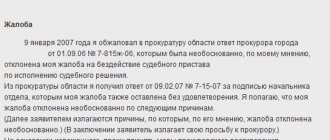The court that passed the sentence or made another appealed decision shall notify the persons specified in Article 389.1 of this Code of the appeal or presentation filed, if the complaint or presentation affects their interests, with an explanation of the right to file a complaint or submit objections in writing, indicating deadline for their filing and sends them copies of the complaint, presentation, as well as objections to them. Objections received to a complaint or presentation are added to the materials of the criminal case.
Functions of the prosecutor
The prosecutor differs in his functions from other citizens and officials in criminal proceedings. For him, the legislation (“Federal Law “On the Prosecutor's Office”, the Code of Criminal Procedure of the Russian Federation) provides for special articles and provisions, according to which he is responsible for observing the legality of the procedural actions being carried out. In this case, the public prosecutor performs only a supervisory function and in no case should he himself participate in investigative actions.
The prosecutor, according to the Code of Criminal Procedure of the Russian Federation, can only give written or oral instructions on the implementation of any actions, and also has the right to freely check the case materials, the compliance of the actions carried out by investigators or inquiry officers, and the norms of the criminal procedure code.
The prosecutor himself does not perform any procedural function and cannot directly interfere in the affairs of investigators or interrogators.
Performance
In court, the prosecutor is the state prosecutor, performing his main functions - upholding the law. In the event that the rights of the parties or legal norms were significantly violated, and the prosecutor saw this, he can make a representation.
A prosecutor's presentation is an act of the prosecutor's response to a violation of the law, submitted to the body or official that is authorized to consider such cases.
The document consists of several parts, namely: introductory, descriptive and operative.
The prosecutor’s presentation is an example of the fact that the state prosecutor can not only petition for a punishment, as many are accustomed to thinking, but also monitor compliance with the law in any area of public life.
Procedure
The filing procedure consists of several stages.
- After the court makes a decision, the prosecutor prepares a presentation within 10 days. You need to contact the court that accepted the document.
- The court notifies the other participants in the proceedings that a motion has been filed. They are given copies and their rights to file a written objection are explained.
- Time limits are established within which the parties can file an objection.
- Submitted objections are considered within the framework of the case under the Criminal Code of the Russian Federation.
- When the deadline for appeal expires and it is no longer possible to file objections, the materials are sent for consideration by the court as part of the appeal.
While the case is in court, as well as within 5 days before the hearing begins, the prosecutor has the right to send an additional submission. This is possible in situations where:
- the submission was submitted in a brief form in order to comply with the deadlines for appeal;
- there is a need to make clarifications or additions to respond to objections.
The document should not contain requirements that worsen the position of the accused in the absence of such a clause in the brief submission.
Appeal
After a verdict has been rendered in the court of first instance, the prosecutor has the authority to appeal the court decision, which does not yet have legal force, that is, he has the same rights as other participants in the criminal process.
An appeal (prosecutor's appeal) can be used if initially the evidence related to the case was not presented in court, the declared witnesses were not called, and significant motions were rejected. The essence of the case itself does not matter, and the prosecutor’s presentation in a criminal case contains only a description of the violated criminal procedural norms of the law.
It should be noted that evidence or witnesses can only be accepted if they were previously stated in the court of first instance, but were not accepted. This rule applies not only to the prosecutor’s presentation, but also to all appeals to the appellate authority.
The prosecutor can appeal court verdicts, including verdicts of the Judicial Collegium in criminal cases, and verdicts in military cases of the Supreme Court of the Russian Federation.
In what cases does the prosecutor file an appeal?
The prosecutor acts in court in a criminal case as a public prosecutor. He supports the prosecution and is vested with a number of procedural rights, including the right to appeal judicial decisions.
The prosecutor's office prepares and submits an appeal if it considers the following to be illegal and unfounded:
- Decision on the issue of choosing a preventive measure or extending its term.
- A decision on placement in a medical hospital, including a psychiatric hospital, for examination.
- Decision on the issue of seizure of property (its imposition, establishment/extension of the period).
- A verdict or decision of the court of first instance that has not entered into legal force.
- Decision on the jurisdiction of a criminal case.
- Decision to suspend proceedings in the case.
- The decision to return the case to the prosecutor to eliminate deficiencies.
- Private rulings and court decisions.
- Interim procedural court decisions that are made during the trial.
Simply put, the prosecutor's office has the right to appeal, by way of appeal, any judicial act adopted as part of an investigation or consideration of a criminal case . If a verdict is challenged, along with questions of its illegality and unreasonableness, the question of its injustice may be raised.
The state prosecutor is an independent participant in the process. He is not bound by the decisions and actions of others. Therefore, the representation can be filed irrespective of whether an appeal has been filed on the same issue or not. The position of the prosecutor's office may or may not coincide with the positions of other participants in the criminal case.
Time limits for appeal
The prosecutor is given 10 days from the date of the verdict in the court of first instance to make an appeal. If this deadline is missed, the public prosecutor is returned the presentation, but he can petition for the restoration of the missed deadlines, indicating the valid reasons for which this period was missed.
Within 14 days from the date of the submission, the body to which this document was sent must make a decision. If the response to review the document is positive, the prosecutor also participates in the process, filing petitions and presenting evidence.
It is necessary to note the importance of the participation of the prosecutor in the appellate court. He must be present so that the process is carried out according to the law, without infringing on the rights and freedoms of citizens, that is, the principle of competition is applied.
Application deadlines
After a judicial act is issued, a period specified by law is given for filing a motion. It is 10 days. If the deadlines are not met, the document will not be considered. But the court, at its discretion, can restore them.
Evidence of a valid lack of timely treatment is most often provided by other participants in the process. Public prosecutors are subject to particularly stringent requirements. Therefore, they need to provide as much information as possible about missed deadlines.
Cassation
The prosecutor's cassation submission is somewhat different from the appellate submission, but carries the same semantic load. The difference is that the appeal is filed against the decision of the magistrates, while the cassation is filed against all others.
This document describes in the same way all violations of criminal procedural norms if they were committed in court at the first stages of consideration of the case. There must be indications of exactly which articles were applied incorrectly, which resulted in a violation of the rights of one of the parties involved in the case.
In addition, the appeal presentation of the prosecutor, just like the cassation presentation, contains a solution to the issue of applying the code in the correct version. The deadlines for filing submissions and actions if they are missed are 10 days from the date of the verdict, or a petition to restore the missed period.
If the prosecutor, after making a submission, decides to refuse this action, he has the right to withdraw the document.
Supervisory representation
In the event that a court hearing has already been held, but the prosecutor’s cassation submission is not satisfied, he can appeal the decision in a supervisory procedure.
According to the Federal Law “On the Prosecutor’s Office”, the prosecutor has the right to demand any case from the court office, even for which the deadline for filing a complaint or presentation has been missed, and appeal it through the supervisory procedure. If appealing such cases is not within the competence of this prosecutor, he may make a written request that the prosecutor's supervisory submission be made to a higher public prosecutor.
According to the law, a supervisory appeal has a special procedural status. That is why the law provides for courts that have the right to consider such submissions. According to Article 403 of the Criminal Procedure Code of the Russian Federation, supervisory representations can be brought by the prosecutor of the subject or the Prosecutor General of the Russian Federation.
Reply to the prosecutor
The response to the prosecutor's submission in the supervisory procedure can be either positive or negative. If the answer is positive, the case is considered and a certain decision is made, for example, to cancel the decision of the court in which the case was heard. In this case, the materials are sent for further investigation, if necessary, or an acquittal is rendered.
If the court's answer is negative, then further appeal occurs in the following order: the determinations of the presidiums of the courts of the constituent entities of the Russian Federation or the Judicial Collegium for Criminal Cases can be appealed in the supervisory order, as indicated earlier. Resolutions of the Presidium of the Supreme Court of the Russian Federation are not subject to appeal, except in cases of discovery of new circumstances.
Acquittal of a convicted person under Article 242-1 of the Criminal Code of the Russian Federation
By this ruling, the Moscow City Court confirmed the legality of the verdict of the Zyuzinsky District Court of Moscow, which acquitted the client, lawyer P.A. Domkin. on charges of committing a crime under Article 242.1. Criminal Code of the Russian Federation.
Case No. 10-20763/18
APPEAL DECISION
(EXTRACT)
Moscow city, December 05, 2022
Judicial panel for criminal cases of the Moscow City Court consisting of:
presiding judge Fedorova S.V.,
judges Guchenkova E.A., Zaurbekova Yu.Z.,
with the secretary of the court session Sh.L.K.,
with the participation of the prosecutor of the appeal department of the criminal justice department
Department of the Moscow City Prosecutor's Office Z.A.V.,
defense lawyer - lawyer P.A. Domkin, who presented certificate No. 12171 and warrant No. 12, acquitted by X.
considered in a closed court session the appeal presentation of state prosecutor K.S.V. on the verdict of the Zyuzinsky District Court of Moscow dated October 16, 2022, by which
X, 19... year of birth, native of the city X, citizen of the Russian Federation, registered at the address:...., previously unconvicted,
acquitted of the charge of committing a crime under paragraph “a” of Part 2 of Art. 242.1 of the Criminal Code of the Russian Federation, on the basis of i. 3 parts 2 tbsp. 302 of the Code of Criminal Procedure of the Russian Federation due to the lack of corpus delicti in his actions.
Based on Art. 134 of the Code of Criminal Procedure of the Russian Federation recognized the right to rehabilitation for X.
The preventive measure in the form of house arrest has been cancelled.
The fate of the material evidence was decided by the verdict.
Having heard the report of Judge E.A. Guchenkova, and having heard the participants in the process on the arguments of the appeal presentation, the judicial panel
INSTALLED:
Preliminary investigation authorities accuse X. of acquiring, storing for the purpose of distribution and distributing materials with pornographic images of minors, including persons under fourteen years of age.
The court, having questioned the witnesses, X., having examined the evidence presented, came to the conclusion that in X’s actions there was no corpus delicti under paragraph “a” of Part 2 of Art. 242.1 of the Criminal Code of the Russian Federation, and ruled an acquittal.
In the appeal with additions, State Prosecutor X. expresses disagreement with the verdict, considers it illegal and unfounded, subject to cancellation, due to the inconsistency of the court's conclusions set out in the verdict, the actual circumstances of the criminal case established by the court of first instance, a significant violation of the criminal procedural law and improper application of criminal law. He believes that the court did not comply with the explanations set out in the Resolution of the Plenum of the Supreme Court of the Russian Federation No. 55 of November 29, 2016. The circumstances established by the court contradict the actual circumstances of the criminal case, the testimony of X. himself at the court hearing and at the preliminary investigation.
Believes that the violations of criminal procedure and criminal laws committed by the court cannot be eliminated in the court of appeal.
Taking into account the above, he requests that the verdict be quashed and the criminal case transferred for a new trial in the same court.
In objections to the appeal presentation, lawyer P.A. Domkin considers the verdict to be legal, justified and motivated, the arguments of the appeal are untenable, and therefore requests the acquittal against X. to be left unchanged, the appeal to be rejected.
At the court hearing, prosecutor Z. supported the appeal, asked to cancel the court verdict based on the arguments set out in it, and to transfer the criminal case for a new trial in the same court, in a different composition of the court.
The acquitted X. and the defense lawyer Domkin objected to the arguments of the appeal and asked for the verdict to be left unchanged.
Having checked the materials of the criminal case, having discussed the arguments set out in the appeal and objections to it, the judicial panel finds no grounds for overturning the court's acquittal.
As follows from the minutes of the court hearing, the court examined all the evidence presented, in accordance with the requirements of Art. 305 of the Code of Criminal Procedure of the Russian Federation set out in the verdict the circumstances of the criminal case established by it, the grounds for acquitting the defendant and the evidence confirming these grounds, as well as the reasons for which he rejected the evidence presented by the prosecution. At the same time, the court, in accordance with the provisions of the criminal procedure law, considered all the petitions submitted by the parties and for each of them a reasoned decision was made based on the examined evidence.
During the trial, the court examined and cited in detail in the verdict both the evidence presented by the prosecution and the evidence presented by the defense.
In particular, the court examined the evidence of the prosecution: the testimony of witnesses M., B., S., M., as well as written materials of the criminal case, including: ...
Contrary to the arguments of the appeal, the court reasonably came to the conclusion that the prosecution did not present evidence that indisputably testifies to the presence of elements of the crime charged in X.’s actions, and the evidence presented by the prosecution, including testimony of witnesses, as well as written evidence, are not evidence of X’s guilt in committing a crime.
The verdict provides a detailed analysis of all the evidence. At the same time, the court, having assessed the evidence examined at the court hearing from the point of view of its admissibility, reliability and relevance, both individually and collectively from the point of view of sufficiency to resolve the case on the merits, came to the conclusion that the evidence presented by the prosecution do not form a totality indicating the presence of elements of the specified crime in X.’s actions, while the court, in acquitting X. of the charges brought, assessed written evidence that reflects the conduct of a number of procedural and investigative actions, along with the testimony of persons interrogated in court.
Thus, the court correctly indicated that in this case the following circumstances were reliably established: ...
These facts are confirmed by the totality of evidence examined during the judicial investigation.
At the same time, the judicial panel, having studied the materials of the criminal case, agrees with the conclusions of the court of first instance that the actions imputed by the preliminary investigation body to X., namely that he, having access to the Internet through the program installed on his computer, “ iMul”, downloaded for the purpose of storage and subsequent distribution on a personal computer belonging to him... video recordings related to pornographic materials containing pornographic images of minors, including persons under 14 years of age, which he stored in the memory of his computer with the following inside: a hard magnetic drive, a solid-state drive, and a hard drive; for the purpose of distributing pornographic materials, provided free access to the above ... video recordings of an unlimited number of Internet users who have the iMule program installed on their computers, are not supported by the evidence presented by the prosecution.
As it was established by the court of first instance during the judicial investigation, the testimony of witnesses - attesting witnesses M. and B. confirm the fact of the 20... year operational search activity “inspection of residential premises” at the place of residence of X., but they do not know how the files, containing videos of a pornographic nature, were received by X. and whether they were distributed by the latter.
Testimony of witnesses - operational employees... The Ministry of Internal Affairs of Russia for Moscow S. and M. confirm the fact of receiving information regarding unidentified persons living in the territory of .... Moscow, about the distribution of pornographic materials depicting minors using the Internet, the circumstances of the preparation and conduct of the operational investigation “inspection of residential premises” at X.’s place of residence, as well as the sending of seized items for research, while they are not reliably aware of the distribution namely X. from a personal computer, discovered and seized at his place of residence, pornographic materials.
In addition, from the testimony of witness S., it follows, according to X., that pornographic materials were distributed by a program installed on the computer, while the corresponding video files were freely available only to those who had this program installed.
….
Thus, none of the witnesses questioned, both during the preliminary investigation and during the trial, nor the examined written evidence, as the court of first instance correctly established, indicates that X. acquired and stored for the purpose of distributing materials from pornographic information, including images of minors and persons under 14 years of age, that he has committed any active actions aimed at distributing pornographic information prohibited by law; There is no evidence that the files stored on X.’s computer were obtained by third parties as a result of his deliberate actions, and not as a result of the installed computer program “iMul,” which allows them to be downloaded and distributed to other users automatically.
The court, contrary to the arguments of the appeal, analyzed the testimony of X. himself at the preliminary investigation and at the court hearing, as well as the information contained in the protocol of his confession, and they justifiably gave a critical assessment to the extent that they were refuted by the totality of the examined evidence, which does not raise doubts among the judicial panel.
The protocol of the court session corresponds to the course of the trial, the testimony of all persons interrogated in the court of first instance is set out in the court verdict and they were given a proper assessment, which does not raise doubts among the judicial panel.
Thus, taking into account all the examined evidence, the court came to a reasonable and motivated conclusion that the preliminary investigation authorities and the prosecution did not present sufficient and reliable evidence at the court hearing of the presence in the actions of X. of the crime provided for in paragraph "a" part .2 art. 242.1 of the Criminal Code of the Russian Federation, taking into account the provision of the law that all doubts about the guilt of the accused that cannot be eliminated, in accordance with the provisions of Art. 14 of the Code of Criminal Procedure of the Russian Federation are interpreted in favor of the accused.
The panel of judges agrees with the conclusions of the court of 1st instance, set out in the verdict, according to which the prosecution’s arguments about the illegality of X.’s actions did not find their objective
confirmation, since such conclusions are based only on the evidence examined during the trial, the case was considered by the court fully and objectively, and therefore the arguments of the appeal are untenable.
The correctness of the assessment of the evidence collected in the case, given by the court of first instance in the verdict, does not raise any doubts among the judicial panel.
The court of first instance did not commit any violations of the requirements of the criminal procedural law that entailed the cancellation or modification of the sentence. Contrary to the arguments of the appeal, in accordance with the requirements of the Code of Criminal Procedure of the Russian Federation, following the results of the trial, the court reasonably ruled an acquittal, while the court correctly indicated in the operative part of the verdict the basis for acquittal, provided for in paragraph 3 of Part 2 of Art. 302 of the Code of Criminal Procedure of the Russian Federation - absence of corpus delicti in the act.
Under such circumstances, the judicial panel does not find grounds to satisfy the appeal based on the arguments set out in it.
Based on the above, guided by art. Art. 389.20; 389.22: 389.28; 389.33 Code of Criminal Procedure of the Russian Federation, judicial panel
DEFINED:
The verdict of the Zyuzinsky District Court of Moscow dated October 16, 2018: in relation to X. is left unchanged, the appeal is not satisfied.
Chairman:
Judges:
Practice of application of Article 242.1 of the Criminal Code of the Russian Federation
Responsibility for distributing pornography on the Internet using torrent clients
Resolution submission
In addition to the proposal, which is submitted to the court and contains a set of violated norms, there is also a proposal from the prosecutor to eliminate the violations. The subject of this document may be violations of the law in various areas of public activity and contain requirements for bringing a person (or persons) to financial or disciplinary liability. The response to the submission must be sent in writing to the prosecutor who submitted the document for consideration by the competent authority.
Classification of representations
It is also worth highlighting, based on the above, that there is an illegal classification for this type of document, such as a presentation made by the prosecutor. There are supervisory and non-supervisory representations.
Non-supervisory documents are precisely those that are brought to the court office - appeal, cassation and by way of supervision.
Supervisory representations are related to the direct function of the prosecutor in exercising supervision and identifying facts of violation of laws. This applies primarily to officials employed in the public service.
Complaint about performance
You can file a complaint against any presentation of the prosecutor, if the case concerns individuals or legal entities and is being considered in court.
If the prosecutor does not agree with the ruling or decision of the court and asks to tighten the punishment or increase the fine of an already convicted person, this person has the right to file a complaint with the same court as the prosecutor - the appellate or cassation instance. In any case, the convicted person can raise objections that are based only on the provisions of the law, in writing, independently or with the help of third parties.
Submitting objections
When the prosecutor submits a presentation, other participants in the case may submit their own objections in response to it. Verbal disagreements are documented in writing.
It is important to submit them within the deadline set by the court. It is prescribed in the judicial notice along with the procedure and rights of citizens. A copy of the submission is sent along with it.
A set of documents is sent to each of the parties: the suspect, the accused. If they are in custody, the papers are received at the place of execution of the preventive measure.
Lawyers and representatives also have the right to file an objection. They are sent copies of the document.
What is written in the document
The objection notes:
- name of the court to which and through which the appeal is submitted;
- information about the person submitting the document (full name, procedural status, place of residence, contact information);
- circumstances of the criminal case;
- the decision being appealed;
- date of preparation of the submission, information about the person who sent it;
- grounds for objection;
- disagreement with the justifications of the prosecutor's office;
- date and signature.
It is important to adhere to the same points and order of presentation of events that are present in the presentation. Each reason must be clearly stated. Even if you file an objection, you can prepare an appeal. Documents can complement each other.
There is no need to prepare an objection if the party agrees with the position of the prosecutor's office. But at the same time he insists that the decision is too lenient. Likewise, there is no need to formulate an objection when expressing the opinion that a position is too harsh.
Protest and performance
In current legislation, protest and representation are defined in different articles, but the second term is increasingly used, although the functions of these documents are different. In order not to get confused in the variety of procedural documents that the prosecutor can introduce and declare, it is necessary to accurately establish the meaning of these terms.
Representation, as stated earlier, is the prosecutor’s act of responding to violations. This concept has begun to be used much more often in court hearings. Protest involves strong disagreement with something. And such an approach would be considered contempt of court. Therefore, the term representation - as more democratic - began to be used in most cases.
However, if a protest is a statement about a violation of a single norm of the law, then the proposal submitted by the prosecutor is a complex document. Its subject is several violations of provisions in the law that need to be eliminated or certain persons held accountable.
It should also be noted that all these documents must be considered regardless of what decision is planned to be made. It is unacceptable to voice a refusal to the prosecutor to take measures to eliminate violations if there are no grounds for this.
Contents of the presentation
The information that each prosecutor's submission must contain is quite typical for a court order. However, the need to enter information is determined by the practical significance of this document:
- Name of the court.
- The name of the person submitting the representation (prosecutor) and the procedural position (state prosecutor).
- An indication of which court decision is being appealed or which the prosecutor does not agree with.
- Prosecutor's requirements.
- Reasons why the prosecutor believes the decision is wrong.
- List of documents and evidence that may be attached to the submission.
You can see what the prosecutor’s submission (a sample is given as an example) to eliminate violations in the penal legislation looks like in the photo below.
Thus, the prosecutor, fulfilling his direct duties, must not only identify facts of incorrect application of the law or violation of its norms, but is also obliged to demand any information related to the case and give instructions to eliminate the violation.
With changes in the criminal procedure code, which occurred first in 2007 and then in 2014, the prosecutor was somewhat limited in his powers, but this gave him the right to take the position of an observer and become a disinterested party in any case.
Contents of the document
The criteria for the form and content of the submission are reflected in Article 389.6 of the Code of Criminal Procedure of the Russian Federation. Prosecutor's office employees use a standard form developed at the level of a government agency.
The document must indicate several points:
- Name of the judicial authority to which the appeal is sent.
- Personal data of the citizen who submits the appeal, his procedural status, residential address.
- Details of the court decision, information about the body that issued it.
- Arguments of the person, reasons for updating the decision.
- List of attached documents.
- Citizen's signature.
The applicant may request that the appellate court consider evidence that has already been previously examined by the court. If there are those that were not considered, the reason for the impossibility of transferring them at the first meeting is described.





